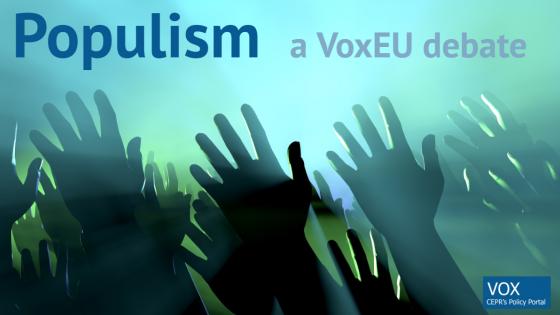The rise of populism is one of the most important political, social, and economic phenomena in recent years, both in advanced and emerging economies (Eichengreen 2018). Depending on the definition, in the last ten years the European populists’ voting share in general elections has increased by about 10 percentage points relative to the previous decade. In some countries, populists got elected and even re-elected.
While it is clear that the recent rise of populism is important, there is no consensus on why it has happened, why now, and why in some countries and not in others. There is no agreement on whether it is actually a problem and why – and if it is a problem, what we should do about it. There is even no consensus on what populism actually is and how to measure it.
This is why CEPR has started a Research and Policy Network on Populism and why Vox is now launching a debate on populism focusing on four broad questions:
- What is populism, how should we define it, and how can we quantify its rise?
- What are the drivers of the recent rise of populism: cultural or economic, or the interaction between the culture and economics? Has it been caused by secular trends or by one-off events such as the recent crisis? Is it related to the revolution in information and communications technologies?
- What are the implications of the rise of populism for economic growth, for other socio-economic outcomes including inequality, for political institutions? What do populists do once they are in power? How does their higher popularity affect policies if they are still not in power?
- Is the recent rise of populism a problem and if it is, what should be done about it?
While we welcome contributions to the debate (contributions should be sent to [email protected]), we open with contributions from three leading CEPR scholars of populism: Barry Eichengreen, Dani Rodrik, and Guido Tabellini. Their pieces identify both important disagreements and areas where their views converge. In particular, all the three authors generally accept Cas Mudde’s definition of populism which emphasises the anti-elite and anti-pluralism features: populists claim to represent homogenous, pure people against the corrupt elites. Eichengreen also includes the authoritarian and nativist tendencies, while Rodrik argues that anti-minority and anti-foreigner sentiment is only a feature of right-wing populists. But the extent to which economists have now accepted the political scientist’s definition of populism, and no longer insist on the ‘economic’ definition of populists, is striking. This definition – dating back to Dornbusch and Edwards’ (1991) book on 20th century Latin American Populism – distinguishes populists as politicians making unrealistic economic policy promises.
Regarding the drivers of the recent rise of populism, the three contributions to the debate discuss both cultural and economic explanations and arrive at slightly different conclusions. Eichengreen focuses on the ‘cultural backlash’ conjecture of Norris and Inglehart (2018). This theory posits that the ‘silent revolution’ of recent decades that promoted younger cohorts’ ‘post-materialist’ values (secularism, autonomy and diversity) has alienated the older generations, who then switched from mainstream parties to populists. Eichengreen, however, warns against the ‘waiting out’ approach that would assume that demographic forces would eventually reduce the populist base. He shows that young cohorts’ values are not fixed will change over time, as ageing makes individuals more conservative. Tabellini also points to the importance of the endogeneity of values – and explains the changing political attitudes and preferences by realignment of social identities. As voters pay more attention to salient issues such as globalisation and immigration rather than redistribution, they identify with social groups defined by education and by cultural norms rather than by income. Tabellini also refers to his theory of evolution of social identities, which predicts that we should observe polarisation along these new dimensions of political cleavage.
Rodrik also discusses Norris and Inglehart’s argument, but points to the growing literature on the importance of economic factors. He argues – and Eichengreen and Tabellini agree with him on this – that the role of economic shocks cannot be neglected. On the other hand, economic and cultural explanations are not necessarily mutually exclusive. It is plausible that the economic shocks activated or aggravated cultural divides.
The three authors take different views on the implications of the rise of populism. Eichengreen – who includes authoritarianism and nativism in his definition of populism – naturally does not see anything positive about the current populist surge. Tabellini agrees, arguing that populists are very dangerous for the supra-national cooperation needed to solve urgent global problems. Rodrik, however, suggests that there may be certain better types of populism. By definition, populists dislike elites and technocrats and focus on dismantling economic checks and balances. Some such checks and balances protect property rights and therefore promote investment and growth. However, some economic restraints are introduced by special interests to limit competition – populists fighting such barriers are actually correct. On the other hand, Rodrik has no sympathy for the authoritarian populists that undermine political checks and balances and destroy democracy.
If we accept that there is a need to oppose the rise of populism (or, at least, of authoritarian populism), what should be done? All three authors agree that the current rise of populism is due to economic factors, either directly or through triggering cultural factors. This creates grounds for optimism, as economic problems can be addressed through economic solutions –inclusive policies that promote social mobility, reduce inequality, and create opportunities for left-behind communities and individuals.
These takeaways from the three opening contributions are unlikely to remain unchallenged – and we are looking forward to continuing this discussion on Vox’s new populism debate page.
References
Dornbusch, R and S Edwards (eds) (1991), The Macroeconomics of Populism in Latin America, NBER.
Eichengreen, B (2018), The Populist Temptation: Economic Grievance and Political Reaction in the Modern Era, Oxford University Press.
Norris, P and R Inglehart (2019), Cultural Backlash: Trump, Brexit, and Authoritarian Populism, Cambridge University Press



